You can combat seasonal allergies with DIY herbal tea blends that harness nature's power. Start with a nettle and peppermint blend to reduce symptoms and boost energy. Try chamomile and lemon balm for relaxation, or ginger and turmeric to decrease inflammation. Elderberry and echinacea provide immune support, while rooibos and rosehip fight oxidative stress. Don't forget licorice root and fennel as natural antihistamines. Proper brewing techniques and storage are essential for maximizing benefits. Remember to start with one cup daily and adjust as needed. By exploring these blends, you'll reveal a world of natural allergy relief options.
Understanding Seasonal Allergies
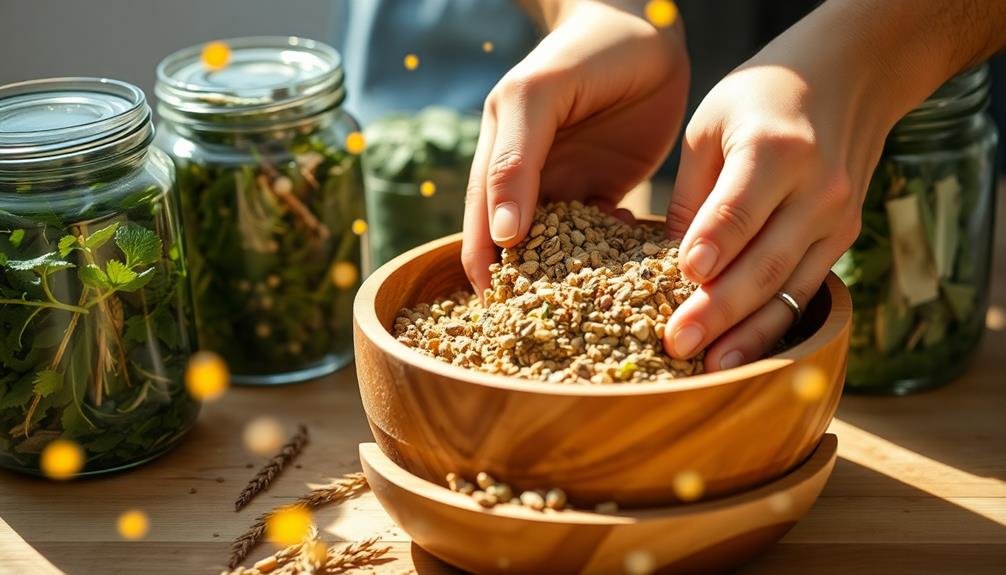
Seasonal allergies strike millions of people each year, causing a range of uncomfortable symptoms. If you're one of those affected, you know the misery of sneezing, itchy eyes, and congestion all too well.
These reactions occur when your immune system overreacts to harmless substances in the environment, such as pollen, mold spores, or dust mites.
Common triggers vary by season. In spring, tree pollen is the usual culprit. Summer brings grass pollen, while fall introduces ragweed and other weed pollens. Indoor allergens like dust mites and pet dander can cause symptoms year-round.
Your body releases histamines in response to these perceived threats, leading to inflammation and the telltale allergy symptoms.
Understanding your specific triggers is essential for managing seasonal allergies effectively. Keep track of when your symptoms flare up and what environmental factors might be contributing.
Consider getting an allergy test to pinpoint your exact triggers. Armed with this knowledge, you can take proactive steps to minimize exposure and find appropriate treatments, including natural remedies like herbal teas, to alleviate your symptoms and improve your quality of life during allergy season.
Benefits of Herbal Teas
Herbal teas offer a natural and soothing approach to managing seasonal allergy symptoms. These caffeine-free infusions can provide relief from congestion, sneezing, and itchy eyes while boosting your overall immune system. Many herbs contain anti-inflammatory and antihistamine properties that help reduce allergy-related discomfort.
When you drink herbal teas, you're not just enjoying a warm beverage; you're also hydrating your body, which is essential for flushing out toxins and allergens. Some teas, like peppermint and eucalyptus, can help clear your nasal passages and ease breathing difficulties.
Others, such as chamomile and lemon balm, promote relaxation and better sleep, which are vital for recovery during allergy season.
Herbal teas are rich in antioxidants, supporting your body's defense against free radicals and oxidative stress. They can also aid digestion and reduce inflammation throughout your body.
Essential Herbs for Allergy Relief
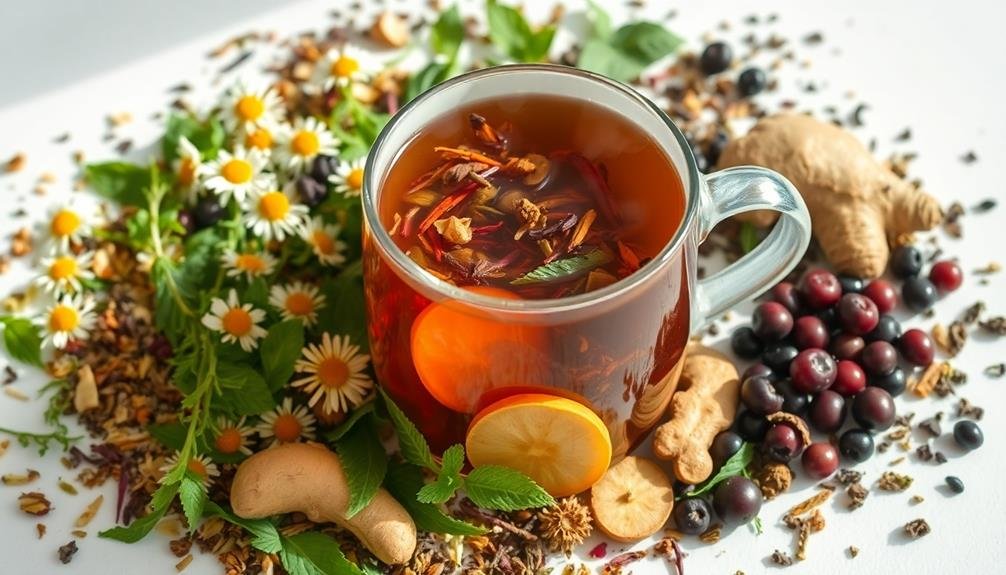
When allergy season strikes, you can turn to several potent herbs for relief. These natural remedies can help alleviate symptoms like sneezing, congestion, and itchy eyes. Let's explore some of the most effective herbs for combating seasonal allergies:
| Herb | Benefits | How to Use |
|---|---|---|
| Stinging Nettle | Reduces inflammation, antihistamine properties | Steep as tea, take capsules |
| Butterbur | Blocks leukotrienes, relieves nasal congestion | Extract or tablets |
| Rosemary | Anti-inflammatory, helps clear sinuses | Tea, essential oil inhalation |
| Ginger | Reduces inflammation, boosts immune system | Tea, fresh ginger in foods |
| Peppermint | Opens airways, relieves congestion | Tea, essential oil inhalation |
These herbs work in different ways to address allergy symptoms. Stinging nettle acts as a natural antihistamine, while butterbur can be as effective as over-the-counter medications for some people. Rosemary and peppermint help clear your sinuses, making breathing easier. Ginger's anti-inflammatory properties can reduce swelling in your nasal passages. You can incorporate these herbs into your daily routine through teas, capsules, or essential oils. Remember to consult with a healthcare professional before starting any new herbal regimen, especially if you're pregnant, nursing, or taking medications.
Preparing Your Tea-Making Space
Your tea-making space is the foundation for creating delicious herbal blends. To prepare this area, start by cleaning and sanitizing your countertop or workspace. You'll want a clutter-free surface to mix and measure your herbs efficiently.
Gather all the necessary tools: a digital scale for precise measurements, glass or ceramic mixing bowls, airtight storage containers, and a mortar and pestle for grinding herbs. Don't forget to include measuring spoons, a fine-mesh strainer, and labels for your finished blends.
Organize your herbs in clear, labeled jars or containers. This will make it easy to find what you need and keep track of your inventory. Store these containers in a cool, dry place away from direct sunlight to preserve the herbs' potency.
Consider setting up a dedicated herb drying area if you're using fresh herbs. Hang bundles of herbs upside down or use a drying rack to guarantee proper air circulation.
Nettle and Peppermint Blend
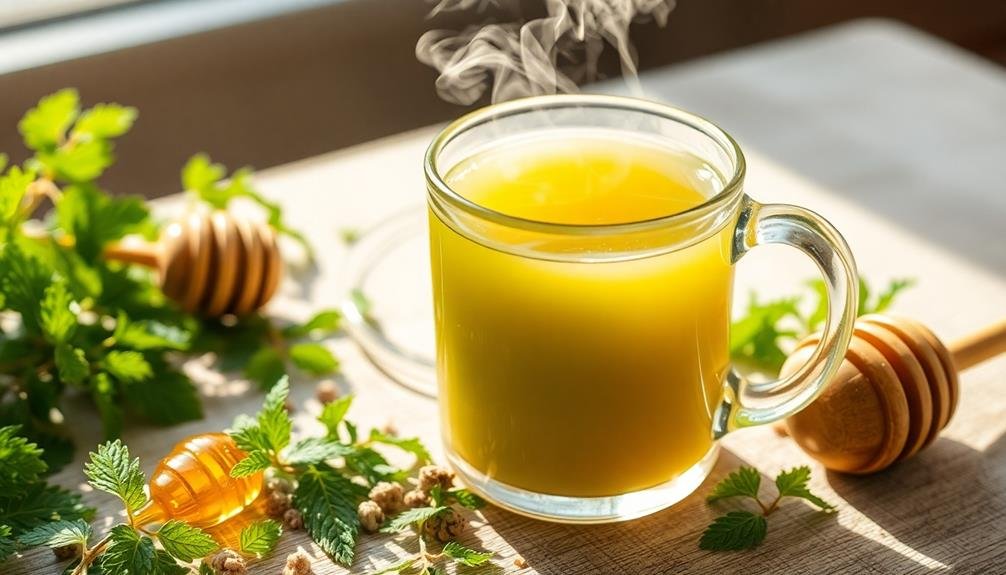
You'll find a potent combination of health benefits in the nettle and peppermint blend.
Nettle offers anti-inflammatory properties and supports urinary health, while peppermint aids digestion and provides an invigorating flavor.
To prepare this blend, mix equal parts dried nettle and peppermint leaves, then steep 1-2 teaspoons in hot water for 5-10 minutes, drinking up to 3 cups daily.
Benefits of Ingredients
The combination of nettle and peppermint in a herbal tea blend offers a powerhouse of health benefits. Nettle, known for its anti-inflammatory properties, can help alleviate allergy symptoms by reducing histamine production in your body.
It's also rich in vitamins and minerals, supporting overall health and boosting your immune system.
Peppermint, on the other hand, is renowned for its soothing effects on the respiratory system. It can help clear congestion and ease breathing difficulties often associated with seasonal allergies.
The menthol in peppermint also provides a cooling sensation, which can be particularly invigorating when you're feeling stuffy.
When combined, these herbs create a synergistic effect that can:
- Reduce allergy symptoms more effectively than either herb alone
- Provide a natural energy boost without caffeine
- Support digestive health and reduce bloating
Preparation and Dosage
Preparing a nettle and peppermint herbal tea blend is simple and rewarding. To make this allergy-fighting infusion, you'll need 2 parts dried nettle leaves and 1 part dried peppermint leaves. Combine these herbs in a glass jar, shaking gently to mix.
For a single cup, use 1-2 teaspoons of the blend per 8 ounces of hot water. Steep for 5-10 minutes, then strain and enjoy.
If you're making a larger batch, use 1/4 cup of the blend per quart of water. Steep for 15-20 minutes, strain, and refrigerate for up to 3 days.
For best results, drink 2-3 cups daily during allergy season. Start with a lower dose and gradually increase to assess your tolerance.
It's best to begin drinking this tea a few weeks before your typical allergy season starts.
Chamomile and Lemon Balm Infusion
A soothing blend of chamomile and lemon balm creates an infusion that's perfect for relaxation and stress relief. This gentle combination can help ease anxiety, promote better sleep, and potentially alleviate seasonal allergy symptoms.
To prepare this infusion, you'll need equal parts dried chamomile flowers and lemon balm leaves. Steep 1-2 teaspoons of the herb mixture in a cup of hot water for 5-10 minutes, depending on your desired strength. Strain the herbs and enjoy your calming tea. You can add a touch of honey for sweetness if you prefer. Drink this infusion up to three times daily, especially before bedtime to improve sleep quality.
The benefits of this chamomile and lemon balm infusion include:
- Reduced anxiety and stress levels
- Improved sleep quality and duration
- Potential relief from seasonal allergy symptoms
Remember that while herbal teas can be beneficial, they're not a substitute for medical treatment. If you're experiencing severe allergy symptoms or have any concerns, consult your healthcare provider.
Always use high-quality, organic herbs to guarantee the best results and avoid potential contaminants.
Ginger and Turmeric Decoction
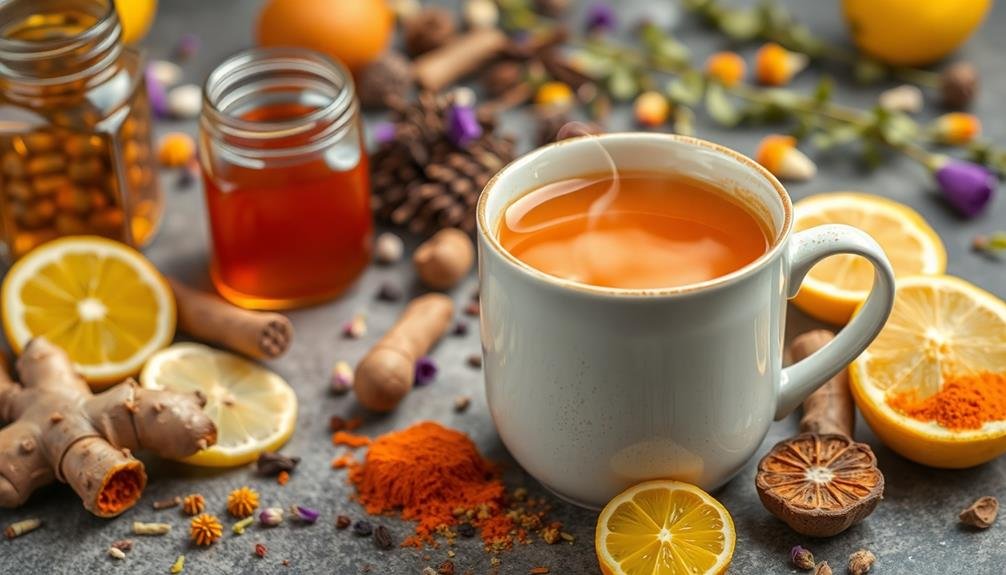
You'll find ginger and turmeric to be a potent anti-inflammatory duo in your herbal tea arsenal.
To prepare this decoction, simmer 1 teaspoon each of fresh grated ginger and turmeric root in 2 cups of water for 10-15 minutes.
For ideal benefits, consume 1-2 cups daily, but consult your healthcare provider if you're on medications or have existing health conditions.
Anti-Inflammatory Powerhouse Combo
This potent herbal blend packs a powerful punch against inflammation. By combining ginger and turmeric, you're creating a synergistic duo that can help alleviate seasonal allergy symptoms. Both herbs are renowned for their anti-inflammatory properties, making them an ideal choice for those seeking natural relief.
To prepare this decoction, you'll need fresh ginger root and turmeric root. Grate or finely chop about an inch of each, then simmer them in water for 10-15 minutes. Strain the liquid and add a squeeze of lemon and a touch of honey to taste. This brew isn't just effective; it's also delicious and warming.
The benefits of this anti-inflammatory powerhouse combo include:
- Reduced swelling in nasal passages
- Decreased mucus production
- Enhanced immune system function
You can enjoy this tea hot or iced, depending on your preference. For best results, drink it regularly throughout allergy season.
Remember, while herbal remedies can be helpful, they're not a substitute for medical advice. If your symptoms persist or worsen, consult your healthcare provider.
Preparation and Dosage
Properly preparing and dosing your ginger and turmeric decoction is essential for peak effectiveness. To make this powerful anti-inflammatory blend, you'll need 1 inch of fresh ginger root and 1 inch of fresh turmeric root, both thinly sliced. Add these to 2 cups of water in a small saucepan and bring to a boil. Reduce heat and simmer for 10-15 minutes, then strain the liquid into a mug.
For peak results, drink this decoction twice daily, ideally in the morning and evening. You can add a pinch of black pepper to enhance turmeric absorption and a teaspoon of honey for sweetness. Don't exceed 3 cups per day, as excessive consumption may cause digestive discomfort.
Store any leftover decoction in the refrigerator for up to 48 hours. When reheating, avoid microwaving to preserve the beneficial compounds. Instead, gently warm it on the stovetop.
If you're using powdered ginger and turmeric, use 1/4 teaspoon of each per cup of water. Remember to consult your healthcare provider before starting any new herbal regimen, especially if you're pregnant, nursing, or taking medications.
Elderberry and Echinacea Mix
For a potent immune-boosting blend, combine elderberry and echinacea in your next homemade tea mix. These powerful herbs work synergistically to support your body's natural defenses against seasonal allergies and common colds. Elderberry is rich in antioxidants and vitamin C, while echinacea stimulates the immune system and reduces inflammation.
To create this blend, you'll need dried elderberries and echinacea root or flowers. Mix equal parts of both herbs, using about 1 teaspoon of the blend per cup of hot water. Steep for 10-15 minutes, strain, and enjoy. You can add a touch of honey or lemon for flavor if desired.
This elderberry and echinacea mix offers several benefits:
- Boosts immune function
- Reduces allergy symptoms
- Shortens the duration of colds and flu
Remember to consult with a healthcare professional before incorporating new herbal remedies into your routine, especially if you're pregnant, nursing, or taking medications.
While this blend is generally safe for most people, it's best to start with small amounts and monitor your body's response. You can drink this tea daily during allergy season or when you feel a cold coming on for maximum benefits.
Rooibos and Rosehip Combination
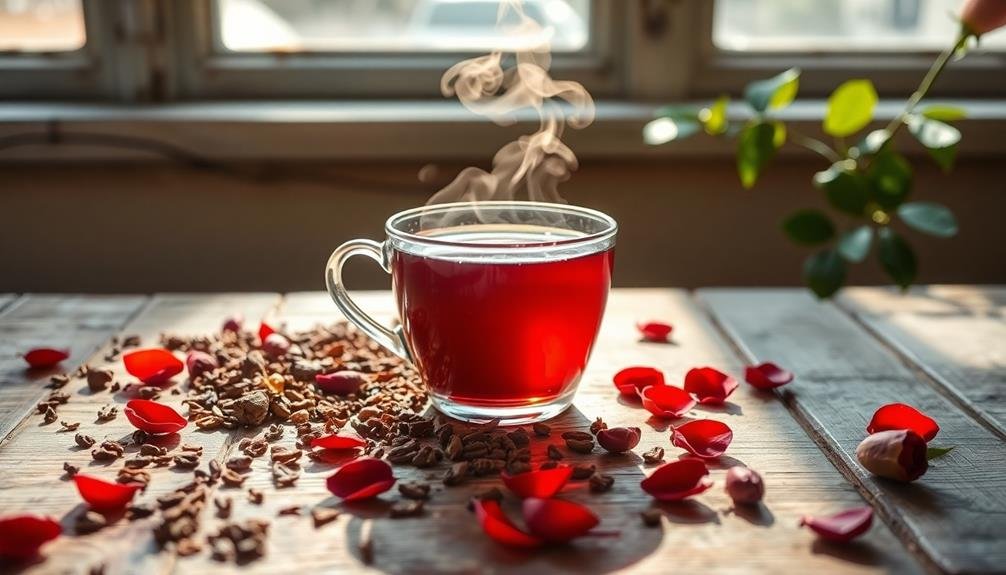
While the elderberry and echinacea mix focuses on immune support, another popular herbal tea blend offers a different set of benefits.
The rooibos and rosehip combination is a powerhouse of antioxidants and vitamin C, making it an excellent choice for those seeking to combat seasonal allergies.
Rooibos, a South African herb, is naturally caffeine-free and rich in flavonoids. These compounds help reduce inflammation and oxidative stress in your body, potentially easing allergy symptoms.
Rosehips, the fruit of the rose plant, are packed with vitamin C, which can boost your immune system and reduce histamine production.
To create this blend, mix equal parts of rooibos tea and dried rosehips. You can add a touch of honey or lemon for flavor if desired. Steep the mixture in hot water for 5-7 minutes, then strain and enjoy. For best results, drink this tea daily during allergy season.
The rooibos and rosehip combination not only helps with allergies but also promotes overall health.
It's a soothing, revitalizing beverage that you can enjoy any time of day without worrying about caffeine-induced jitters or sleep disturbances.
Licorice Root and Fennel Fusion
A harmonious blend of sweet and savory, the licorice root and fennel fusion offers a unique flavor profile with numerous health benefits. This powerful combination can help alleviate seasonal allergy symptoms while providing a soothing and invigorating drink.
To create your own licorice root and fennel fusion, you'll need equal parts of dried licorice root and fennel seeds. Crush the fennel seeds slightly to release their aromatic oils before mixing them with the licorice root. Steep a tablespoon of this blend in hot water for 5-10 minutes, depending on your desired strength.
This herbal tea fusion can help combat seasonal allergies in several ways:
- Licorice root acts as a natural antihistamine, reducing allergy-related inflammation.
- Fennel's expectorant properties help clear congested airways.
- Both herbs have anti-inflammatory effects, easing respiratory discomfort.
You'll enjoy the subtle sweetness of licorice paired with fennel's gentle anise-like flavor.
Proper Brewing Techniques
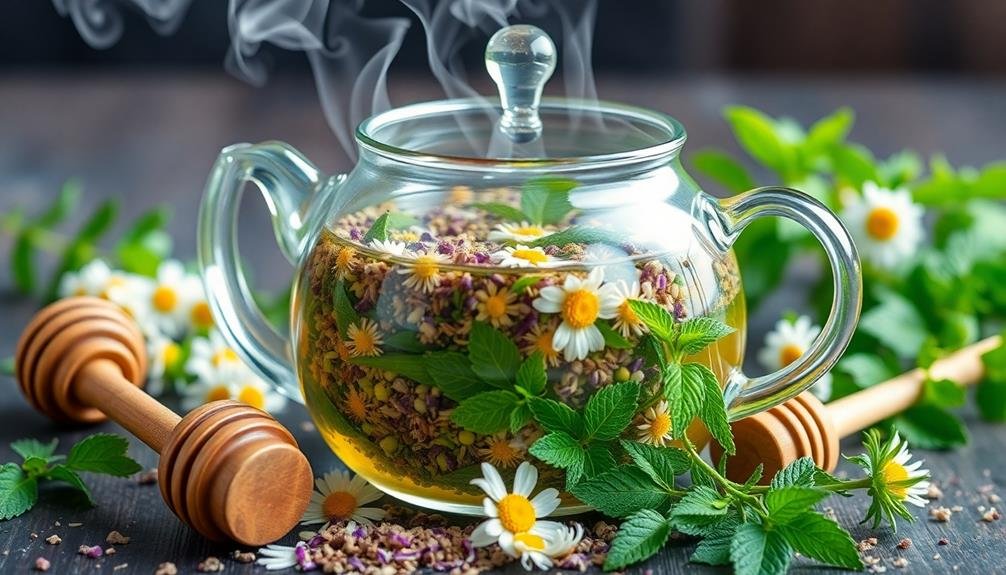
Now that you've learned about specific herbal tea blends, it's important to master the art of brewing them correctly. Start by using fresh, cold water and heating it to just below boiling point (around 200°F or 93°C) for most herbal teas. This temperature helps extract the beneficial compounds without scorching the delicate herbs.
Measure your herbs carefully, using about 1 teaspoon of dried herbs or 1 tablespoon of fresh herbs per cup of water. Place the herbs in a tea infuser or directly in your teapot. Pour the hot water over the herbs and cover the container to trap the steam and essential oils.
Let the tea steep for 5-10 minutes, depending on the herbs used and your desired strength. After steeping, remove the herbs or infuser to prevent over-extraction, which can lead to bitterness. If you're making a larger batch, strain the tea into a separate container.
For maximum benefits, drink your herbal tea while it's still warm. You can add a touch of honey or lemon if desired, but avoid milk as it may interfere with the absorption of certain compounds.
Storage and Shelf Life
You've crafted your perfect herbal tea blend, but proper storage is essential to maintain its freshness and flavor.
To maximize your blend's longevity, store it in an airtight container away from light, heat, and moisture.
Proper Storage Techniques
Proper storage is essential for maintaining the flavor, aroma, and medicinal properties of your DIY herbal tea blends. To guarantee your herbal teas remain fresh and potent, you'll need to protect them from light, heat, moisture, and air exposure.
Store your blends in airtight containers made of glass, ceramic, or metal. Avoid plastic containers, as they can absorb odors and potentially leach chemicals into your herbs.
Keep your herbal tea blends in a cool, dark place away from direct sunlight and heat sources. A pantry or cupboard is ideal. If you live in a humid climate, consider using silica gel packets to absorb excess moisture and prevent mold growth.
Label your containers with the blend name and date of preparation to track freshness.
To maximize the shelf life of your herbal tea blends:
- Avoid touching the herbs with your hands; use a clean, dry spoon instead.
- Store different blends separately to prevent flavor mixing.
- Check your blends regularly for signs of deterioration, such as discoloration or off-odors.
Maximizing Blend Longevity
Most DIY herbal tea blends can last up to a year when stored properly, but you can extend their longevity even further with a few simple techniques. To maximize your blend's shelf life, always start with high-quality, fresh ingredients. Guarantee your herbs are completely dry before mixing to prevent mold growth.
Consider using oxygen absorbers in your storage containers to minimize oxidation and preserve flavor. Rotate your blends regularly, using older batches first. This practice helps maintain freshness and prevents waste.
When creating larger batches, divide them into smaller portions for storage. This approach minimizes exposure to air and light each time you open the container. If you're using delicate ingredients like flower petals, store them separately and add them just before brewing to maintain their potency.
Periodically check your blends for signs of deterioration, such as changes in color, aroma, or texture. If you notice any off-putting smells or visible mold, discard the blend immediately.
Daily Consumption Guidelines
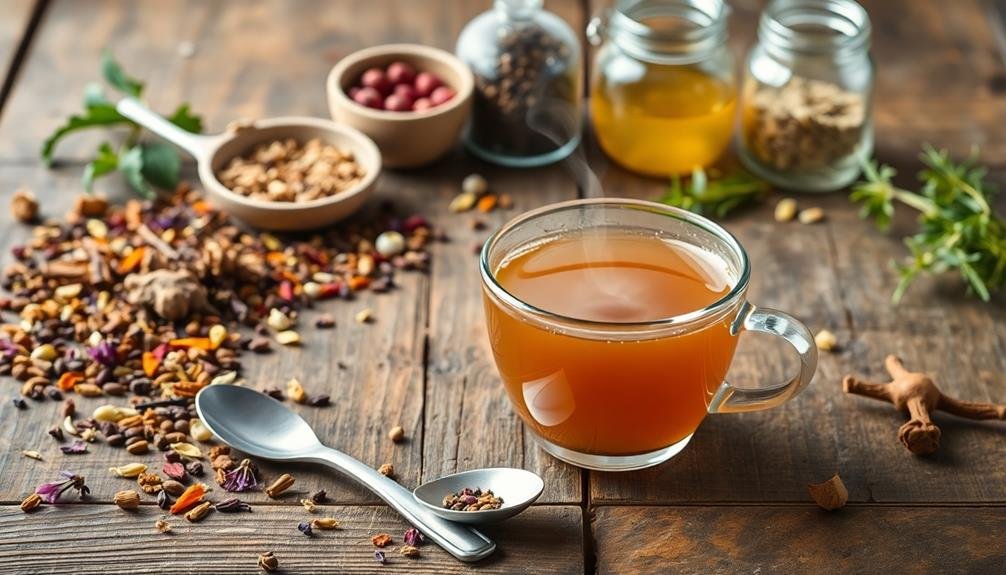
When enjoying your homemade herbal tea blends, it's essential to reflect on daily consumption guidelines. While these teas can offer relief from seasonal allergies, moderation is key. Start with one cup per day and gradually increase to three cups if needed. Pay attention to your body's response and adjust accordingly.
Be mindful of the herbs you're using and their potential interactions with medications or existing health conditions. Some herbs, like chamomile or peppermint, are generally safe for daily consumption. Others, such as echinacea or licorice root, should be used more sparingly or in cycles.
To guarantee you're getting the most benefits from your herbal tea blends, follow these guidelines:
- Steep your tea for the recommended time, usually 5-10 minutes.
- Use fresh, high-quality herbs and store them properly.
- Rotate your blends to prevent developing tolerances.
Remember that herbal teas are a complement to, not a replacement for, medical advice. If you experience persistent allergy symptoms or adverse reactions, consult your healthcare provider.
Frequently Asked Questions
Can I Take Herbal Teas for Allergies While Pregnant or Breastfeeding?
You should consult your doctor before taking herbal teas for allergies while pregnant or breastfeeding. Some herbs can be unsafe during these periods. Your healthcare provider can recommend safe alternatives to manage your allergy symptoms.
Are There Any Potential Side Effects of Consuming These Herbal Tea Blends?
You should be aware of potential side effects when consuming herbal tea blends. They can cause allergic reactions, interact with medications, or lead to digestive issues. It's best to consult your doctor before trying new herbal remedies.
How Long Does It Take to See Results From Drinking Allergy-Fighting Herbal Teas?
You'll likely notice some relief within a few days of regular consumption. However, it can take 2-4 weeks to experience the full benefits. Everyone's different, so be patient and consistent with your tea-drinking routine.
Can Children Safely Consume These Herbal Tea Blends for Allergy Relief?
You should consult a pediatrician before giving herbal teas to children for allergies. While some herbs are safe, others may cause side effects or interact with medications. It's best to err on the side of caution with kids.
Are These Herbal Teas Effective for Pet Allergies as Well as Seasonal Allergies?
While herbal teas can help with seasonal allergies, they're not specifically designed for pet allergies. You'd need different treatments for pet-related symptoms. However, some teas might provide general relief from common allergy symptoms you're experiencing.
In Summary
You've now got the tools to create your own allergy-fighting herbal tea blends. Remember, consistency is key. Brew your chosen blend daily and sip it throughout the day for best results. Don't forget to store your herbs properly to maintain their potency. While these teas can offer relief, they're not a substitute for medical advice. If your symptoms persist or worsen, consult your doctor. Enjoy your natural, soothing remedies and breathe easier this allergy season!

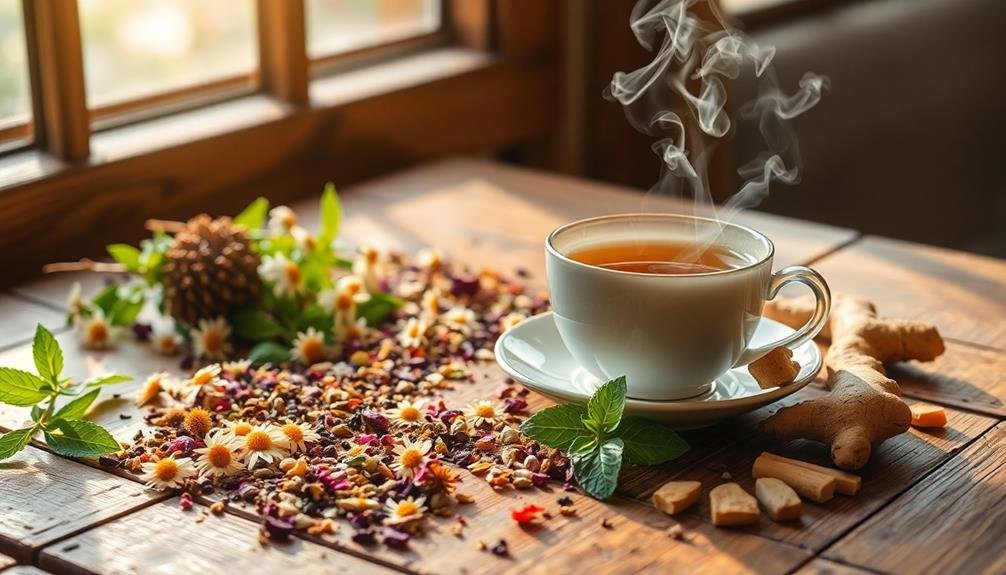



Leave a Reply